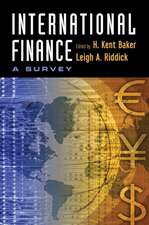Sovereign Debt and International Financial Control: The Middle East and the Balkans, 1870–1914: Palgrave Studies in the History of Finance
Autor Ali Co?kun Tunçeren Limba Engleză Hardback – 26 aug 2015
Din seria Palgrave Studies in the History of Finance
-
 Preț: 362.10 lei
Preț: 362.10 lei - 9%
 Preț: 764.93 lei
Preț: 764.93 lei - 9%
 Preț: 626.29 lei
Preț: 626.29 lei - 18%
 Preț: 737.26 lei
Preț: 737.26 lei - 15%
 Preț: 522.89 lei
Preț: 522.89 lei -
 Preț: 451.65 lei
Preț: 451.65 lei - 15%
 Preț: 701.06 lei
Preț: 701.06 lei - 18%
 Preț: 726.37 lei
Preț: 726.37 lei - 15%
 Preț: 712.22 lei
Preț: 712.22 lei - 15%
 Preț: 530.25 lei
Preț: 530.25 lei - 18%
 Preț: 1114.21 lei
Preț: 1114.21 lei - 18%
 Preț: 1006.55 lei
Preț: 1006.55 lei - 18%
 Preț: 726.06 lei
Preț: 726.06 lei - 18%
 Preț: 786.84 lei
Preț: 786.84 lei - 18%
 Preț: 792.03 lei
Preț: 792.03 lei - 18%
 Preț: 724.94 lei
Preț: 724.94 lei - 15%
 Preț: 702.54 lei
Preț: 702.54 lei - 18%
 Preț: 723.69 lei
Preț: 723.69 lei -
 Preț: 388.72 lei
Preț: 388.72 lei - 15%
 Preț: 694.19 lei
Preț: 694.19 lei - 18%
 Preț: 782.72 lei
Preț: 782.72 lei - 15%
 Preț: 637.59 lei
Preț: 637.59 lei - 18%
 Preț: 1108.51 lei
Preț: 1108.51 lei - 9%
 Preț: 920.30 lei
Preț: 920.30 lei - 15%
 Preț: 711.89 lei
Preț: 711.89 lei -
 Preț: 383.12 lei
Preț: 383.12 lei - 18%
 Preț: 958.25 lei
Preț: 958.25 lei - 18%
 Preț: 1008.28 lei
Preț: 1008.28 lei -
 Preț: 445.88 lei
Preț: 445.88 lei - 18%
 Preț: 1113.58 lei
Preț: 1113.58 lei - 15%
 Preț: 646.75 lei
Preț: 646.75 lei - 15%
 Preț: 702.05 lei
Preț: 702.05 lei -
 Preț: 450.11 lei
Preț: 450.11 lei - 18%
 Preț: 794.39 lei
Preț: 794.39 lei - 18%
 Preț: 948.29 lei
Preț: 948.29 lei - 15%
 Preț: 697.97 lei
Preț: 697.97 lei - 18%
 Preț: 728.74 lei
Preț: 728.74 lei
Preț: 891.33 lei
Preț vechi: 1086.99 lei
-18% Nou
Puncte Express: 1337
Preț estimativ în valută:
170.55€ • 178.55$ • 141.12£
170.55€ • 178.55$ • 141.12£
Carte tipărită la comandă
Livrare economică 07-21 aprilie
Preluare comenzi: 021 569.72.76
Specificații
ISBN-13: 9781137378538
ISBN-10: 1137378530
Pagini: 264
Ilustrații: XVII, 243 p.
Dimensiuni: 140 x 216 x 21 mm
Greutate: 0.45 kg
Ediția:1st ed. 2015
Editura: Palgrave Macmillan UK
Colecția Palgrave Macmillan
Seria Palgrave Studies in the History of Finance
Locul publicării:London, United Kingdom
ISBN-10: 1137378530
Pagini: 264
Ilustrații: XVII, 243 p.
Dimensiuni: 140 x 216 x 21 mm
Greutate: 0.45 kg
Ediția:1st ed. 2015
Editura: Palgrave Macmillan UK
Colecția Palgrave Macmillan
Seria Palgrave Studies in the History of Finance
Locul publicării:London, United Kingdom
Cuprins
1 Introduction
2 Governing Sovereign Debt: Defaults And Enforcement, 1870-1914
2.1 Origins Of Defaults: Financial And Monetary Constraints
2.2 Costs Of Defaults: Enforcement And Conditionality
2.2.1 Direct Sanctions And Preventing Access To Future Credit
2.2.2 Protective Clauses And Bondholder Committees
2.2.3 Assignment And Control Of Future Revenues
2.3 Summary And Conclusions
3 From Financial Control To Colonisation: Egypt, 1862-1914
3.1 Khedives As Borrowers: Crisis, Default And Punishment
3.2 The Loss Of Political Sovereignty And Imperial Rivalry
3.3 Summary And Conclusions
4 From ''Financial Barbarism'' To Cooperation: The Ottoman Empire, 1854-1914
4.1 Lending To The Sick Man Of Bond Markets
4.2 The Loss Of Fiscal Sovereignty And Cooperation
4.3 Summary And Conclusions
5 From Fiscal Control To Financial Supervision: Serbia, 1878-1914
5.1 A Newborn State Surrounded By Foreign Creditors
5.2 Financial Control In A ''LandOf Monopolies''
5.3 Summary And Conclusions
6 From Financial Supervision To Political Resistance: Greece, 1879-1914
6.1 Financial Isolation And Settlement: A History Of Defaults
6.2 Refining The Control And ''Mistrust'' To Creditors
6.3 Summary And Conclusions
7 International Financial Control And Sovereign Risk
7.1 Determinants Of Sovereign Risk Before 1914: A Critical Review
7.2 Measuring Sovereign Risk: Sources And Methodology
7.3 Structural Breaks In Spread: The Bai-Perron Test
7.4 Summary And Conclusions
8 Debt, Default And Resistance: Political Economy Of Ifcs
8.1 Fiscal Capacity, Political Regimes And Tax Systems: A Review
8.1.1 Taxation Vs Representation
8.1.2 Direct Vs Indirect Taxes
8.1.3 Political Regime Type And Public Debt
8.1.4 Foreign Rule: Resistance Vs Cooperation
8.1.5 Conclusion
8.2 Varying Degrees Of Success And The Extent Of Control
8.3 Political Institutions And Tax Systems In The Middle East And The Balkans
8.4 Summary And Conclusions
9 Conclusion
Bibliography
Data Appendix
2 Governing Sovereign Debt: Defaults And Enforcement, 1870-1914
2.1 Origins Of Defaults: Financial And Monetary Constraints
2.2 Costs Of Defaults: Enforcement And Conditionality
2.2.1 Direct Sanctions And Preventing Access To Future Credit
2.2.2 Protective Clauses And Bondholder Committees
2.2.3 Assignment And Control Of Future Revenues
2.3 Summary And Conclusions
3 From Financial Control To Colonisation: Egypt, 1862-1914
3.1 Khedives As Borrowers: Crisis, Default And Punishment
3.2 The Loss Of Political Sovereignty And Imperial Rivalry
3.3 Summary And Conclusions
4 From ''Financial Barbarism'' To Cooperation: The Ottoman Empire, 1854-1914
4.1 Lending To The Sick Man Of Bond Markets
4.2 The Loss Of Fiscal Sovereignty And Cooperation
4.3 Summary And Conclusions
5 From Fiscal Control To Financial Supervision: Serbia, 1878-1914
5.1 A Newborn State Surrounded By Foreign Creditors
5.2 Financial Control In A ''LandOf Monopolies''
5.3 Summary And Conclusions
6 From Financial Supervision To Political Resistance: Greece, 1879-1914
6.1 Financial Isolation And Settlement: A History Of Defaults
6.2 Refining The Control And ''Mistrust'' To Creditors
6.3 Summary And Conclusions
7 International Financial Control And Sovereign Risk
7.1 Determinants Of Sovereign Risk Before 1914: A Critical Review
7.2 Measuring Sovereign Risk: Sources And Methodology
7.3 Structural Breaks In Spread: The Bai-Perron Test
7.4 Summary And Conclusions
8 Debt, Default And Resistance: Political Economy Of Ifcs
8.1 Fiscal Capacity, Political Regimes And Tax Systems: A Review
8.1.1 Taxation Vs Representation
8.1.2 Direct Vs Indirect Taxes
8.1.3 Political Regime Type And Public Debt
8.1.4 Foreign Rule: Resistance Vs Cooperation
8.1.5 Conclusion
8.2 Varying Degrees Of Success And The Extent Of Control
8.3 Political Institutions And Tax Systems In The Middle East And The Balkans
8.4 Summary And Conclusions
9 Conclusion
Bibliography
Data Appendix
Recenzii
“This book will certainly become a go-to reference for historians interested in the region and economists seeking better understanding of the mechanisms of default. … this is an admirable work of nuanced historical interpretation that questions received generalizations and raises many questions for future research. Economists and economic historians interested in sovereign default, state capacity and even the debt crisis in the Eurozone will do well to read it.” (Rui Esteves, EH.Net, March, 2016)
“Ali Coşkun Tunçer’s work fills a historiographical gap concerning the establishment and the role of international financial control committees in Egypt … . Ali Coşkun Tunçer’s work is essential reading, both for experts in the field and for all those interested in deep ening their understanding of the role of international financial committees in the Mediterranean in the nineteenth century.” (Giampaolo Conte, The Journal of European Economic History, Issue 3, January, 2015)
“Ali Coşkun Tunçer’s work fills a historiographical gap concerning the establishment and the role of international financial control committees in Egypt … . Ali Coşkun Tunçer’s work is essential reading, both for experts in the field and for all those interested in deep ening their understanding of the role of international financial committees in the Mediterranean in the nineteenth century.” (Giampaolo Conte, The Journal of European Economic History, Issue 3, January, 2015)
Notă biografică
Ali Co?kun Tunçer is Lecturer in Modern Economic History at the Department of History, University College London (UCL). Previously he taught and conducted research in economic history at the London School of Economics and the European University Institute, Italy. His research focuses on the economic and financial history of the late Ottoman Empire, long-term economic change in the Middle East and Southeast Europe, the history of financial markets from the early modern era to the present, and long-term market integration in Europe and the Mediterranean.















